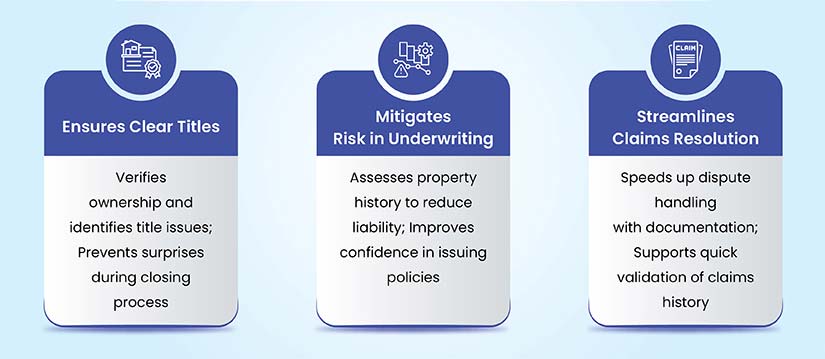- Accurate, licensed deed and mortgage data is fundamental for title insurance, enabling thorough searches and precise risk assessments that protect against financial losses.
- Bulk data licensing streamlines processes, offering centralized access to comprehensive records, enhances efficiency and accuracy in title insurance operations.
- Future trends, like AI and blockchain, will further transform data usage, emphasizing automation and security, ensuring the industry remains robust and reliable.
Table of Contents
- Understanding licensed deed and mortgage data
- Why licensed deed and mortgage data is critical for title insurance
- How deed and mortgage data supports title insurance companies
- Leveraging bulk data licensing solutions for title insurance
- Future trends in deed and mortgage data usage through licensing
- Conclusion
In the world of real estate transactions, title insurance companies navigate a high-risk environment where financial stability depends on accurate data and risk management. As of September 2024, the US title insurance industry reported a 5.1% loss ratio (CEIC data), highlighting the financial impact of title defects and the need for comprehensive real estate records to mitigate risks.
Approximately 30% of title insurance claims arise from fraud and forgery, often missed in public record searches, with an average claim cost exceeding $143,000 (independent analysis). While the financial impact of incomplete deed transfer data and mortgage loan data is hard to quantify, these data gaps heighten risks, increasing title defects and fraudulent transactions.
The lack of accurate deed records and public mortgage data leads to costly issues like ownership disputes, undisclosed liens, and fraud. Mortgage data providers offer property data solutions for deed verification and mortgage title searches, helping reduce financial risk. Reliable mortgage data verification is crucial for minimizing claims, ensuring financial stability, and improving title insurance companies’ efficiency.
Understanding licensed deed and mortgage data
In title insurance, access to licensed deed and mortgage data plays a pivotal role in verifying real estate records, assessing risks, and ensuring seamless property transactions. This data provides critical insights into ownership history, financial obligations, and potential legal encumbrances, enabling title insurance companies to conduct thorough mortgage title searches and issue accurate policies.
A deed record includes grantor and grantee names, property legal description, transfer date and consideration amount, which help establish a clear chain of titles. Similarly, mortgage loan data contains information about the lender, loan amount, interest rate, and terms, which is essential for mortgage lien searches and risk assessment. Additionally, public mortgage data reveals outstanding liens or encumbrances that could impact property ownership. The lack of accurate deed and mortgage data verification exposes title insurers to the risk of issuing policies on properties with unresolved claims, which can lead to costly litigation.
To ensure reliability, title insurance companies source deed transfer data and mortgage data from county recorder’s offices, courthouses and land registries, as well as title plants, which are private databases maintained by title companies. Mortgage data providers also play a crucial role in providing property data solutions that streamline underwriting processes and reduce financial exposure. However, the mere availability of data is not enough; data accuracy and validation are crucial.
Errors in real estate records can lead to title defects, ownership disputes and fraudulent claims. To mitigate these risks, title insurers implement rigorous data validation processes, including cross-verification with multiple sources, AI-driven error detection and automated quality control checks. These measures help minimize mortgage data verification errors, ensuring financial stability and reducing claims expenses.
By leveraging licensed deed and mortgage data, title insurance companies can enhance their underwriting accuracy, mitigate risks, and maintain trust in real estate transactions. Without precise and validated information, the integrity of title insurance policies is compromised, emphasizing the critical need for comprehensive property data solutions in the industry.
Why licensed deed and mortgage data is critical for title insurance
Licensed deed and mortgage data stands as the bedrock of the title insurance industry, its importance rooted in the intricate nature of property transactions. These datasets are not merely repositories of information; they are critical tools for risk mitigation, enabling title companies to navigate the complexities of real estate with precision.
First, access to comprehensive, licensed data empowers title insurers to conduct exhaustive title searches. This process, essential for establishing a clear chain of title, relies heavily on accurate deed transfer data and property deed data. Without it, hidden encumbrances, undisclosed heirs or fraudulent activities could remain undetected, leading to substantial financial liabilities.
Next, mortgage loan data within licensed datasets provides a crucial understanding of financial encumbrances. This knowledge allows title companies to assess the risk of foreclosure, understand existing loan terms and accurately reflect the property’s financial status in title policies. This is vital for protecting lenders and ensuring the validity of mortgage liens.
Moreover, licensed data ensures data integrity, a cornerstone of title insurance. Reliable deed records and public mortgage data, sourced from reputable providers, undergo rigorous validation processes, minimizing the risk of errors and fraud. This accuracy is paramount in mitigating claims stemming from forged documents or inaccurate records, which can cause significant financial losses.
In essence, licensed deed and mortgage data enables title insurance companies to provide reliable coverage, safeguarding stakeholders from the financial consequences of title defects and ensuring the smooth transfer of property ownership. This reliance on accurate, licensed data is not just a best practice; it is a fundamental requirement for the industry’s stability and trustworthiness.
How deed and mortgage data supports title insurance companies

The title insurance industry relies heavily on deed and mortgage data to ensure the accuracy and security of real estate transactions. This data plays a crucial role in title searches, risk assessment, and claims management, helping title insurance companies mitigate financial risks and issue accurate policies. From verifying ownership history to identifying potential encumbrances, access to licensed property data solutions enhances efficiency and reduces exposure to disputes.
Here are the key ways deed and mortgage data support title insurance companies:
Strengthens title searches and examinations
To verify ownership and uncover potential risks, insurers conduct title searches before issuing a title insurance policy. Deed transfer data and public mortgage data provide crucial insights into a property’s history, helping to detect title defects before closing.
What this data reveals:
- Deed records confirm grantor and grantee names, legal property descriptions, and ownership history.
- Mortgage loan data provides lender details, loan amounts, interest rates, and mortgage terms.
- Mortgage title searches identify outstanding liens or encumbrances that may impact ownership rights.
Detailed property data solutions enable title insurance companies to ensure that all ownership transfers and financial obligations are accurately recorded. Incomplete or outdated real estate records can lead to ownership conflicts, complicating transactions further and increasing the likelihood of title insurance claims. Advanced mortgage data providers aggregate records from multiple sources, including county recorder offices and title plants, ensuring accurate deed verification before policies are issued. Additionally, automated data validation tools allow insurers to detect anomalies in property transactions, reducing the risk of insuring a defective title.
The lack of accurate mortgage data verification exposes title insurers to the risk of issuing policies on properties with ownership issues, outstanding liens, or fraudulent activity. Ensuring comprehensive deed verification allows insurers to detect and address issues proactively, preventing costly claims and strengthening the integrity of the title insurance industry.
Enhances risk assessment and underwriting
Deed and mortgage data play a critical role in risk assessment by helping title insurers evaluate potential liabilities before underwriting a policy. By analyzing real estate records, insurers assess the likelihood of ownership conflicts, boundary issues, or fraudulent sales.
How this data helps mitigate risks:
- Deed verification confirms property transfers, previous claims, and boundary disputes.
- Mortgage data providers supply historical real estate records to identify potential red flags.
- Mortgage lien searches reveal unpaid loans, tax liens, or multiple conflicting claims.
Data-driven risk assessment allows title insurance companies to evaluate whether a property has a clear chain of titles and determine the appropriate level of coverage. Risk factors, such as previous ownership disputes, improper deed filings, and unrecorded liens can impact the value of a title insurance policy. By leveraging mortgage data verification, insurers can better predict the probability of future claims and adjust policy terms and premiums accordingly.
For instance, if a property has multiple mortgages recorded over time, insurers can use public mortgage data to determine whether prior loans were properly discharged. Failure to verify lien releases can lead to disputes that jeopardize property ownership verification. The integration of AI-powered mortgage title searches helps insurers process large volumes of data efficiently, reducing errors and increasing underwriting accuracy.
By leveraging licensed property data solutions, insurers can adjust policy terms, coverage limits, and premiums based on the property’s risk profile. This data-driven underwriting ensures financial stability and prevents future losses, making title insurance policies more precise and reliable.
Simplify Title Searches with Bulk Data Licensing
Gain instant access to deed and mortgage records for accurate underwriting!
Supports claim management and resolution
When a title insurance claim arises, insurers rely on deed and mortgage data to investigate disputes and validate claims. Access to accurate public mortgage data allows insurers to determine the cause of title defects and assign liability efficiently.
How this data aids in claims resolution:
- Deed records provide legal proof of ownership to support claims investigations.
- Mortgage data verification helps confirm whether unpaid debts, tax liens, or title fraud contributed to the dispute.
- Historical mortgage loan data assists in tracing undocumented transactions or improperly discharged mortgages.
The claims resolution process often involves retracing a property’s ownership history to verify whether a disputed deed transfer or lien release was handled correctly. Title insurance companies use deed verification to confirm ownership rights, while mortgage title searches help identify previous financial encumbrances that may have led to a defective title. Without comprehensive real estate records, resolving such claims becomes time consuming and costly.
For example, if a property owner discovers a previously undisclosed mortgage lien after purchasing a property, the title insurance company must verify whether the lien was legally discharged or improperly recorded. Mortgage data providers play a critical role by offering historical insights into loan payments, refinances, and foreclosure records. Additionally, modern data analytics tools can identify patterns in fraudulent property transactions, helping insurers resolve disputes quickly and accurately.
By leveraging data-driven claims management, title insurance companies can expedite claim resolutions and reduce financial exposure. This process also prevents future claims by ensuring that title defects are corrected before new policies are issued. The use of AI-powered mortgage lien searches further enhances the efficiency of claims investigations, reducing turnaround times and improving the accuracy of liability assessments.
Leveraging bulk data licensing solutions for title insurance
Bulk data licensing solutions provide title insurance companies with centralized access to deed and mortgage records, enabling more efficient title searches, risk assessments, and claims resolution. By obtaining licensed property datasets from mortgage data providers, county recorders, and title plants, insurers gain direct access to comprehensive real estate records, reducing reliance on fragmented public sources.
These bulk property datasets streamline deed verification and mortgage title searches, allowing insurers to quickly identify ownership history, encumbrances, liens, and outstanding mortgage obligations. Centralized access improves data accuracy and minimizes manual data retrieval errors, ensuring faster underwriting and more precise policy issuance.
Moreover, AI-powered risk analysis, enabled by bulk data licensing, allows insurers to identify fraudulent transactions, inconsistencies in ownership transfers and discrepancies in liens. Insurers improve financial stability, lower claims costs and streamline real estate transactions by incorporating high-quality mortgage data verification, thus strengthening confidence in their title insurance.
Enhance Risk Assessment with Mortgage Data Verification
Identify title defects, prevent fraud, and improve underwriting with accurate data!
Future trends in deed and mortgage data usage through licensing
The future of deed and mortgage data licensing points toward increased automation and integration. Expect AI-driven analytics to refine risk assessment and predict title defects with greater accuracy. Blockchain technology may enhance data security and transparency by streamlining property ownership verification.
Real-time data updates will become standard, enabling faster transaction processing. Cloud-based platforms will facilitate seamless data sharing and collaboration among title insurers, lenders and real estate professionals. Enhanced APIs will allow for deeper integration into existing workflows.
Furthermore, we expect increased focus on data standardization, ensuring interoperability across different platforms. Predictive analytics will become commonplace, allowing title companies to proactively identify potential issues. These trends will drive efficiency and accuracy, transforming how title insurance leverages deed and mortgage data.
Conclusion
In conclusion, licensed deed and mortgage data is indispensable for the title insurance industry. Its accurate and comprehensive analysis underpins effective title searches, risk assessments and claims resolution. Bulk licensing solutions provide vital efficiencies, while future trends promise greater automation and integration.
By leveraging these data resources, title insurers can navigate the complexities of real estate transactions, mitigate risks, and ensure the security of property ownership. As technology advances, the strategic use of deed and mortgage data will continue to be a cornerstone of the industry’s success.





